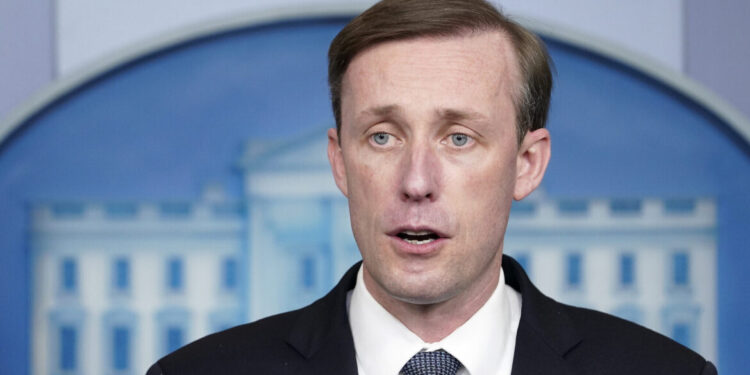Recent developments indicate that Israel is escalating its campaign to deploy forces into Rafah. This weekend, White House National Security Adviser Jake Sullivan is scheduled to visit Saudi Arabia and Israel. His aim is to possibly make one final attempt to persuade leaders that an incursion into Rafah could result in a tactical victory but strategic defeat for Israel against Hamas, exacerbating the conflict and jeopardizing the prospects for a lasting peace agreement in the region.
A move into Rafah is recognized as a humanitarian disaster that could alienate the international community from Israel. It might also garner increased sympathy for the recognition of Palestine but potentially jeopardize Israel’s opportunity to collaborate with the United States and Saudi Arabia on a genuine peace initiative in the Middle East. Such a victory in Rafah is considered by numerous esteemed military strategists to be a fool’s errand.
Last week, Sullivan informed reporters that the United States is collaborating with Israel to find a more effective strategy to defeat Hamas, particularly in Rafah. He reflected on the United States’ challenging history with counterinsurgency efforts in the Middle East and urged Israel to develop a political strategy for the coastal region governed by Hamas since 2007.
“Military pressure is necessary but not sufficient to completely defeat Hamas,” Sullivan stated. “Without a political plan for Gaza’s future and the Palestinian people, the terrorists will continue to return.”
According to Axios, citing a senior U.S. official, the Biden administration and the Israeli government have agreed not to “significantly expand” any operations in the densely populated city prior to Sullivan’s visit. Additionally, Israel’s international allies and aid organizations have consistently cautioned against a large-scale ground incursion into Rafah, which is densely populated with refugees and where Israel claims four Hamas battalions are entrenched.
Several other key figures from the U.S. Defense and State Departments view the Israeli strategy for a complete victory over Hamas as unsuccessful. “We seem to be grappling with the concept of victory,” stated U.S. Deputy Secretary of State Kurt Campbell at a NATO youth conference in Miami on Monday. “Often, when we pay close attention to the statements of Israeli leaders, they seem to focus on the notion of an overwhelming battlefield triumph, a total victory. I don’t think that’s a realistic or achievable outcome.”
At the start of each daily Israel Briefing from the Prime Minister’s Office, the stated goal is the complete destruction of Hamas. In several recent interviews, Prime Minister Benjamin Netanyahu reaffirmed that this objective remains unchanged, arguing, “We must achieve victory, which entails destroying all the battalions in Rafah, and that is what we will do.”
In a recent CBS interview, Secretary of State Antony Blinken expressed concern that an incursion into Rafah would complicate matters for Israel further. “In areas of Gaza cleared by Israel, we are witnessing a resurgence of Hamas, including in the north and in Khan Younis,” stated Blinken.
Blinken stated that a tough Israeli offensive on Rafah might yield some initial success, but he warned it could come at an incredibly high cost to civilians. Moreover, he noted that any success achieved would likely be neither durable nor sustainable.
“And they will be left holding the bag on an enduring insurgency because a lot of armed Hamas will be left no matter what they do in Rafah,” Blinken said. “If they leave and get out of Gaza, as we believe they need to do, then you’re going to have a vacuum, and a vacuum that’s likely to be filled by chaos, by anarchy, and ultimately by Hamas again,” he said.
It’s not only the U.S. that is concerned about Israel potentially taking a wrong turn. As reported earlier this week, Defense Minister Yoav Gallant sparked a political storm at a press conference on Wednesday evening. He openly criticized Prime Minister Netanyahu’s lack of decision regarding the governance of Gaza post-Hamas.
At the press conference, Gallant expressed his displeasure with the Prime Minister’s absence of a “Day After Plan.” He urged Prime Minister Netanyahu to decide and announce that Israel will not impose civilian control over the Gaza Strip, will not institute military governance there, and will promptly establish a governing alternative to Hamas in the Gaza Strip.
He further stated, “We are faced with the necessity of making difficult choices for our nation’s future, prioritizing national interests above any other considerations, despite potential personal or political repercussions.”
Meanwhile, this week, the leaders at the Arab League summit unanimously agreed to adopt the “Bahrain Declaration,” which calls for a peace conference on the Palestinian-Israeli conflict to be held in Manama, confirmed by a Bahraini official. Ambassador Ahmed Al Turaifi, Head of Arab and African Affairs at Bahrain’s Foreign Ministry, stated that Bahrain would start preparations to host the peace conference following the conclusion of the Arab League summit.
“When the foreign ministers of the Arab world met on Tuesday, there was a unanimous agreement that the next diplomatic step towards ending the war on Gaza had to be steps taken towards hosting a peace conference to resolve the Palestinian issue and once and for all give the Palestinian people their full right as a member state in front of the world,” Mr Al Turaifi told The National (An international News outlet)
“What makes this conference significantly different this time around, compared to past efforts and peace conferences is that the world has finally awoken following the tragedy of the people in Gaza, with 143 countries voting at the UN General Assembly and sending a clear message that the two-state solution is the only path forward,” he added.
Sullivan’s discussions in Israel this weekend could represent the final opportunity to explore an alternative strategy for victory that avoids an aggressive approach in Rafah, potentially preserving a prospective agreement with Saudi Arabia. The accord between Israel and Saudi Arabia has the potential to establish genuine peace in the region, yet Sullivan faces a significant challenge, aware that the Israeli government’s hardliners oppose the two-state solution.
Jim Williams covers the conflict between Israel and Hamas, offering comprehensive written articles and video coverage on various Middle Eastern issues.
Washington based CEO & Founder of LJC. Media covering politics, sports, & entertainment A seven-time Emmy Award-winning TV producer, director, and podcast host. Digital Director and Washington Bureau Chief at News Talk Florida & The Daily Cable























































